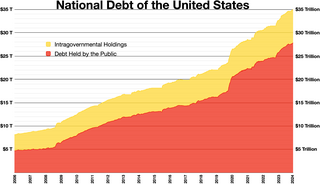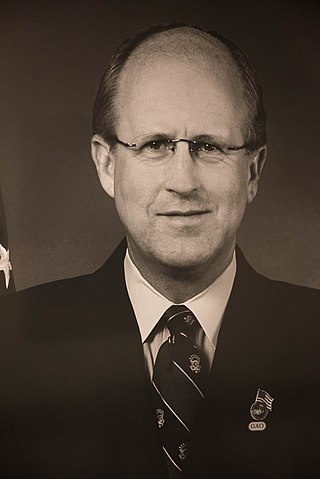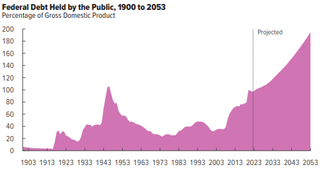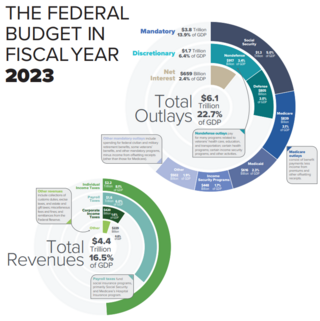
The Gramm–Rudman–Hollings Balanced Budget and Emergency Deficit Control Act of 1985 and the Balanced Budget and Emergency Deficit Control Reaffirmation Act of 1987 were the first binding spending constraints on the federal budget.

The national debt of the United States is the total national debt owed by the federal government of the United States to Treasury security holders. The national debt at any point in time is the face value of the then-outstanding Treasury securities that have been issued by the Treasury and other federal agencies. The terms "national deficit" and "national surplus" usually refer to the federal government budget balance from year to year, not the cumulative amount of debt. In a deficit year the national debt increases as the government needs to borrow funds to finance the deficit, while in a surplus year the debt decreases as more money is received than spent, enabling the government to reduce the debt by buying back some Treasury securities. In general, government debt increases as a result of government spending and decreases from tax or other receipts, both of which fluctuate during the course of a fiscal year. There are two components of gross national debt:

Paul Efthemios Tsongas was an American politician who represented Massachusetts in the United States Senate from 1979 until 1985 and in the United States House of Representatives from 1975 until 1979. A member of the Democratic Party, he ran for president in 1992. He won eight contests during the presidential primaries, but lost the nomination to Bill Clinton, who later won the general election. Born in Lowell, Massachusetts, Tsongas graduated from Dartmouth College, Yale Law School and the Kennedy School of Government. After working for the Peace Corps and as an aide to Congressman F. Bradford Morse, Tsongas successively won election as a city councilor and county commissioner.

Peter George Peterson was an American investment banker who served as United States Secretary of Commerce from February 29, 1972, to February 1, 1973, under the Richard Nixon administration. Peterson was also chairman and CEO of Bell & Howell from 1963 to 1971. From 1973 to 1984 he was chairman and CEO of Lehman Brothers. In 1985, he co-founded the private equity firm The Blackstone Group, and served as chairman. In the same year, Peterson became chairman of the Council on Foreign Relations, a position he held until his retirement in 2007, after which he was named chairman emeritus. In 2008, Peterson was ranked 149th on the "Forbes 400 Richest Americans" with a net worth of $2.8 billion. He was also known as founder and principal funder of The Peter G. Peterson Foundation, which is dedicated to promoting fiscal austerity.
A balanced budget amendment is a constitutional rule requiring that a state cannot spend more than its income. It requires a balance between the projected receipts and expenditures of the government.
Deficit hawk is a political slang term in the English speaking world for people who place great emphasis on keeping government budgets under control. 'Hawk' can be used to describe someone calling for harsh or pain-inducing measures in many political contexts; in the specific context of deficit reduction, the term is more commonly applied to those advocating for cuts in government spending than to those supporting increases in taxes.

David M. Walker is an American CPA and public servant who served as the Comptroller General of the United States from 1998 to 2008, and is founder and CEO of the Comeback America Initiative (CAI) from 2010 to 2013.

Alice Mitchell Rivlin was an American economist and budget official. She served as the 16th vice chair of the Federal Reserve from 1996 to 1999. Before her appointment to the Federal Reserve, Rivlin was named director of the Office of Management and Budget in the Clinton administration from 1994 to 1996. Prior to that, she was instrumental in the establishment of the Congressional Budget Office and became its founding director from 1975 to 1983. A member of the Democratic Party, Rivlin was the first woman to hold either of those posts.

The United States budget comprises the spending and revenues of the U.S. federal government. The budget is the financial representation of the priorities of the government, reflecting historical debates and competing economic philosophies. The government primarily spends on healthcare, retirement, and defense programs. The non-partisan Congressional Budget Office provides extensive analysis of the budget and its economic effects. CBO estimated in February 2024 that Federal debt held by the public is projected to rise from 99 percent of GDP in 2024 to 116 percent in 2034 and would continue to grow if current laws generally remained unchanged. Over that period, the growth of interest costs and mandatory spending outpaces the growth of revenues and the economy, driving up debt. Those factors persist beyond 2034, pushing federal debt higher still, to 172 percent of GDP in 2054.
In American political theory, fiscal conservatism or economic conservatism is a political and economic philosophy regarding fiscal policy and fiscal responsibility with an ideological basis in capitalism, individualism, limited government, and laissez-faire economics. Fiscal conservatives advocate tax cuts, reduced government spending, free markets, deregulation, privatization, free trade, and minimal government debt. Fiscal conservatism follows the same philosophical outlook as classical liberalism. This concept is derived from economic liberalism.

The history of the United States public debt began with federal government debt incurred during the American Revolutionary War by the first U.S treasurer, Michael Hillegas, after the country's formation in 1776. The United States has continuously experienced fluctuating public debt, except for about a year during 1835–1836. To facilitate comparisons over time, public debt is often expressed as a ratio to gross domestic product (GDP). Historically, the United States public debt as a share of GDP has increased during wars and recessions, and subsequently declined.

I.O.U.S.A. is a 2008 American documentary film directed by Patrick Creadon. The film focuses on the shape and impact of the United States national debt. The film features Robert Bixby, director of the Concord Coalition, and David Walker, the former U.S. Comptroller General, as they travel around the United States on a tour to let communities know of the potential dangers of the national debt. The tour was carried out through the Concord Coalition, and was known as the "Fiscal Wake-Up Tour."
The Peter G. Peterson Foundation is an American billionaire-funded foundation established in 2008 by Peter G. Peterson, former US Secretary of Commerce in the Nixon Administration and co-founder of the Blackstone Group, an American financial-services company.
The Committee for a Responsible Federal Budget (CRFB) is a non-profit public policy organization based in Washington, D.C. that addresses federal budget and fiscal issues. It was founded in 1981 by former United States Representative Robert Giaimo (D-CT) and United States Senator Henry Bellmon (R-OK), and its board of directors includes past heads of the House and Senate Budget Committees, the Congressional Budget Office, the Office of Management and Budget, and the Government Accountability Office.
The National Commission on Fiscal Responsibility and Reform was a bipartisan Presidential Commission on deficit reduction, created in 2010 by President Barack Obama to identify "policies to improve the fiscal situation in the medium term and to achieve fiscal sustainability over the long run". The 18-member Commission, consisting of 12 members of Congress and six private citizens, first met on April 27, 2010. A report was released on December 1, recommending a combination of spending cuts and tax increases.
The 2012 United States federal budget was the budget to fund government operations for the fiscal year 2012, which lasted from October 1, 2011 through September 30, 2012. The original spending request was issued by President Barack Obama in February 2011. That April, the Republican-held House of Representatives announced a competing plan, The Path to Prosperity, emboldened by a major victory in the 2010 Congressional elections associated with the Tea Party movement. The budget plans were both intended to focus on deficit reduction, but differed in their changes to taxation, entitlement programs, defense spending, and research funding.

The Budget Control Act of 2011 is a federal statute enacted by the 112th United States Congress and signed into law by US President Barack Obama on August 2, 2011. The Act brought conclusion to the 2011 US debt-ceiling crisis.

Deficit reduction in the United States refers to taxation, spending, and economic policy debates and proposals designed to reduce the federal government budget deficit. Government agencies including the Government Accountability Office (GAO), Congressional Budget Office (CBO), the Office of Management and Budget (OMB), and the U.S. Treasury Department have reported that the federal government is facing a series of important long-run financing challenges, mainly driven by an aging population, rising healthcare costs per person, and rising interest payments on the national debt.

Addison Wiggin is an American writer, publisher, and filmmaker. He is the host of the YouTube show The Wiggin Sessions, covering financial markets, the economy and politics. He writes the financial daily The Daily Missive. Addison is also the host and editor of The Essential Investor, a resource for individuals who manage their own money.
Budget sequestration is a provision of United States law that causes an across-the-board reduction in certain kinds of spending included in the federal budget. Sequestration involves setting a hard cap on the amount of government spending within broadly defined categories; if Congress enacts annual appropriations legislation that exceeds these caps, an across-the-board spending cut is automatically imposed on these categories, affecting all departments and programs by an equal percentage. The amount exceeding the budget limit is held back by the Treasury and not transferred to the agencies specified in the appropriation bills. The word sequestration was derived from a legal term referring to the seizing of property by an agent of the court, to prevent destruction or harm, while any dispute over said property is resolved in court.










